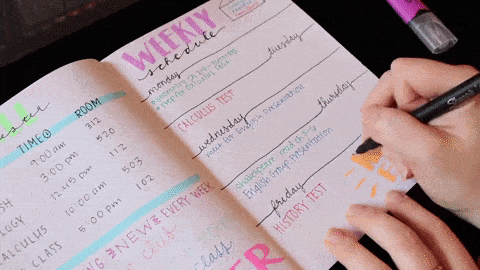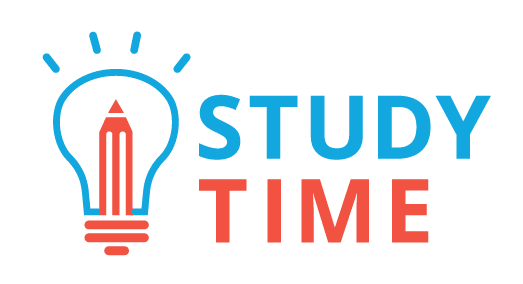Having a mile-long list of things you need to get done is one of the worst feelings brought about by NCEA. It seems to happen every year – just as term three is rounding to a close, your teachers throw a tonne of internals at you, and they make them all due at the same time.
Then, just when you think you’re out of the woods, exam season hits. At this point, it starts all over again – an entire year’s worth of work is due to be assessed in the space of two or three weeks. It’s the same freaking problem. Yikes.
If you ask your teachers what to do in this situation, they’ll probably tell you to just start studying earlier. Sure, this is good advice, but if your internals are all due in a week or so, it’s not that helpful.

Luckily for you, StudyTime understands that not all problems are solved by simply “studying more”. In this article, we’ll take you through some practical tips you can use to get ahead on your studies, even if you’re running low on time.
Get Organised
There’s a lot we can say here – organisation truly is the trick to making great strides, whether it’s in your internals or exams. As you all probably know, organisation means being well prepared, and keeping all your ducks in a row. There’s some pretty specific aspects to focus on if you’ve got lots of work and not so much time, so let’s talk through a few.
Don’t Finish Everything
The key to finishing multiple internals (or multiple subject’s worth of revision for exams) is by being strategic. You will have strengths, and you will have weaknesses, and that’s perfectly fine!
For internals, play to your strengths from the get-go. Read through the entire internal as soon as you can, and highlight the questions you know you can get started on. You want to hit the ground running here, so that you can get as many questions done as soon as you can.
Not to mention, having a few wins under your belt early on is just really motivating! Knowing that you’ve got a few points in the bank already can be reassuring too, and can relieve some of the pressure.

Know where you’re at
When it comes to studying for final exams, we need to get into the NCEA mindset. If you don’t already know, NCEA exams tend to look pretty similar each year – it’s the same general questions, just asked in a different context.
Have a geez through some NCEA past papers to get an idea of what they’re looking for in each subject. Note down the questions you’re pretty confident with, try out a few of them, and check your answers to make sure you’ve got it.
For a little bit more reassurance, you can even count up the points like an NCEA marker would, to see what grade you’re currently sitting at. If you do this for all of your subjects, you’ll get a good idea of what subjects you’re doing well in, and which ones could use a little work.

From here, you can prioritise.
If you’re consistently struggling more with one subject above all of the others, this is where you’ll want to start. After that, there’s a few things to think about when it comes to choosing which subjects to work on next. These can include:
- What do you need for next year’s study, especially if you’re going to university?
- What do you enjoy the most?
- What gets you the most credits?
Ultimately, what you prioritise will likely be quite different to what everyone else prioritises, and that’s cool! As long as it works for you, then there’s nothing to worry about.

Be Aware of Your Deadlines
Might sound obvious, but so many students can struggle with planning ahead, just because they aren’t aware of deadlines. Sure, you might know when something is due in the back of your head, but you’ll want to be super aware of that due date to make sure it doesn’t slip by.
A quick and easy way to improve organisation with deadlines is to write them down literally everywhere. Use the sticky notes app on your computer, a piece of paper beside your bed, the fridge, the bathroom door, you name it – jot those dates down whenever you’ll see them often.

Being reminded on a daily basis about what’s coming up forces your brain to realise how quickly things are creeping up. Not to mention, you’ll be way less likely to forget any of your assignments, too!
Also – make your own deadlines!
Knowing that you’ve got an essay due on October 12th is a big ask. For certain types of students, they’ll see this deadline and think, cool, how hard can it be? Suddenly, it’s October 11th, and they’re only starting to write their first draft at 9:48pm.

Usually, this comes down to “writing an essay” or “doing some maths questions” sounding real easy in theory. In practice, though? Not so straightforward.
So, put on your strategizing hat, and break big tasks into small ones.
Instead of saying that your final essay is due on a given date, split it up! Give yourself a date to finish the introduction, a slightly later date for the first paragraph, and so on. For maths, cut your assignment up into different sections or subtopics. Basically, break it down in a way that makes sense for your internal (or even, for your exam).
Thinking ahead like this will help you to balance your workload evenly, reducing last-minute crams and ensuring you cover as much content as possible.
Time Management
Ahh, yes, the bane of every NCEA student’s existence. Time management can be a confusing and scary topic – how do we manage our time when we don’t even have any to start with?

Well, there’s a few tips that might just make things a little easier. Let’s talk through a couple.
Bulldoze your roadblocks
Just being honest here – sometimes, it’s like NCEA chucks impossible questions into exams and internals just for the fun of it. When those hard to beat questions pop up, what’s the best course of action?
Pretend you never saw them, and move on.

Hear us out on this one.
If you’ve got a lot of stuff due, or you’ve got a lot of exams to study for, the best use of your time is not trying to solve something that feels too difficult. Breeze on past that particular question to go rack points elsewhere in your internal, or move onto learning more achievable skills for your exam.
This has another benefit, too. Taking a break from a tricky question and returning to it after a while can make it that much easier to figure out! Going in with a clear head – and a head that’s been mulling over this question in the background – can make finding the answer a lot faster.
Use time deliberately
We’ll cut to the chase here – work smarter, not harder.
When you sit down to work on your internal, or study for your exam, there’s a few things you want to pay attention to to improve your efficiency. Here’s a quick summary:
- Focus on being focused
Take your phone out of the room, use Chrome extensions to block distracting sites, or shut yourself in the library with only a textbook and a pen. Crack down on yourself, eliminate your big distractions, and get your work done with maximum productivity!
- Use all of your time
There’s 24 hours in a day, and if you’re pressed for time when it comes to internals or externals, you’ll want to get creative with how you use it. This doesn’t mean you shouldn’t take breaks (more on that later), but if you’re in the right headspace to work, we suggest going for it!
For example, put on a YouTube video or podcast related to natural selection and genetic drift while you’re cooking dinner. If the bus or train to school takes a little while, print out a webpage or bring a textbook to work on during this period. The key thing here is that small study sessions add up fast!
- Work to a schedule
We’re not encouraging you to spend precious time drawing up an aesthetically pleasing study planner you probably won’t stick to. However, drawing up a quick guide to how you’ll spend your day each morning can be super useful.

This is great, because it gets you thinking about what you have to get done (which, of course, you’ll coordinate with the upcoming due dates you’ve taken note of). You’ll also find yourself accomplishing more! Working towards a goal, such as a list of things you want to achieve, is far more motivating than just doing whatever you feel like.
Time blocking
Combine moving past roadblocks and planning, and what do we get? Time blocking, baby.

This is a great productivity technique that’s all about getting you moving through work as quickly as you can, without getting stagnant. Remember how we’ve discussed the importance of planning out your day? Yep, this is where time blocking comes in.
It’s all about creating “blocks” of time to devote to specific topics, subjects, or tasks. By intentionally sectioning out your day ahead of time, you’ll be going into things feeling organised and in control. Your revision will flow better, you’ll be less inclined to multitask, and you’ll likely feel a lot less overwhelmed and distracted.
You’ll also have more defined breaks, which can lead to better time management overall.
Speaking of, the time has finally come:
Take good breaks
When you’ve got a lot going on, you’re probably going to be feeling a lot more stressed than you normally do. Stress can make it harder to focus, especially for long periods, making your study sessions inefficient and ineffective.
The solution for this is to work in a study break every so often, which, admittedly, isn’t really groundbreaking information. What you might not know is that there is such a thing as a productive study break. Allow us to elaborate.
During a productive study break, you’re able to refresh and rejuvenate, allowing yourself to come back into your revision feeling energised and in the zone. In contrast, a bad study break (which might involve endless scrolling on your social media of choice) will leave you feeling sluggish, unmotivated, and more distracted than you were before.

So, what should we actually be doing during our study breaks?
It’s an excellent question that’s a little tricky to answer. Study breaks aren’t a “one size fits all”, and different people will benefit from different things.
Generally, the main things to avoid on your study break are things that are hard to put down, such as TikTok, TV, movies, or video games. These are all things that are hard to drag yourself away from, leading to a major disruption in your schedule. They also tend to shatter the focus you had going before, so when you return to studying, you’re not in the right headspace anymore.
Instead, try out some of these:
- Make (and enjoy!) a snack
Whether it’s a plate of carrots and hummus, or just a bag of chips, snacks are the light at the end of the studying tunnel. Not only do they provide your brain with the energy it needs to keep pushing on, but making your own study snack platter is a really productive way to spend 5-20 minutes!
- Get moving
After a long study session, you’ll undoubtedly be feeling a lot of frustration directed at NCEA – and we can’t blame you. Channel this anger into hitting a new bench press personal best at the gym, go for a run or bike around your neighbourhood, or have a heated game of table tennis with your sibling. Whatever type of physical activity floats your boat.

- Take a nap
Studying is tiring. It’s probably not a good idea to fall asleep for a few hours and mess up your schedule, but a nice 20-minute siesta could be just what you want. Bonus – chug an energy drink or strong coffee directly beforehand to take a “caffeine nap”, which is even better at improving energy than a regular nap.
- Clean up
Having a messy desk or room doesn’t do much for your ability to focus. Pop on your favourite upbeat songs, crack a window for some fresh air, and get organising! Not only are you being literally productive during your break, but you’ll be in a better headspace when you return to studying, too.
To round things off:
Studying is hard. It’s extra hard when you’ve got a million internals due at once, or all of your exams are stacked one after the other. Still, there are lots of things you can do to make it all easier!
Try to get as strategic as you can with what you study, stay aware of your deadlines, and work to a schedule. Don’t get caught up on tricky concepts that you’re not at all confident with, either – save them for later on, when you’ve already got the basics down.
If you can use these tips in your revision, we’re sure you’ll be nailing every single one of your internals and exams, and you’ll be stressing less along the way. You got this!


0 Comments